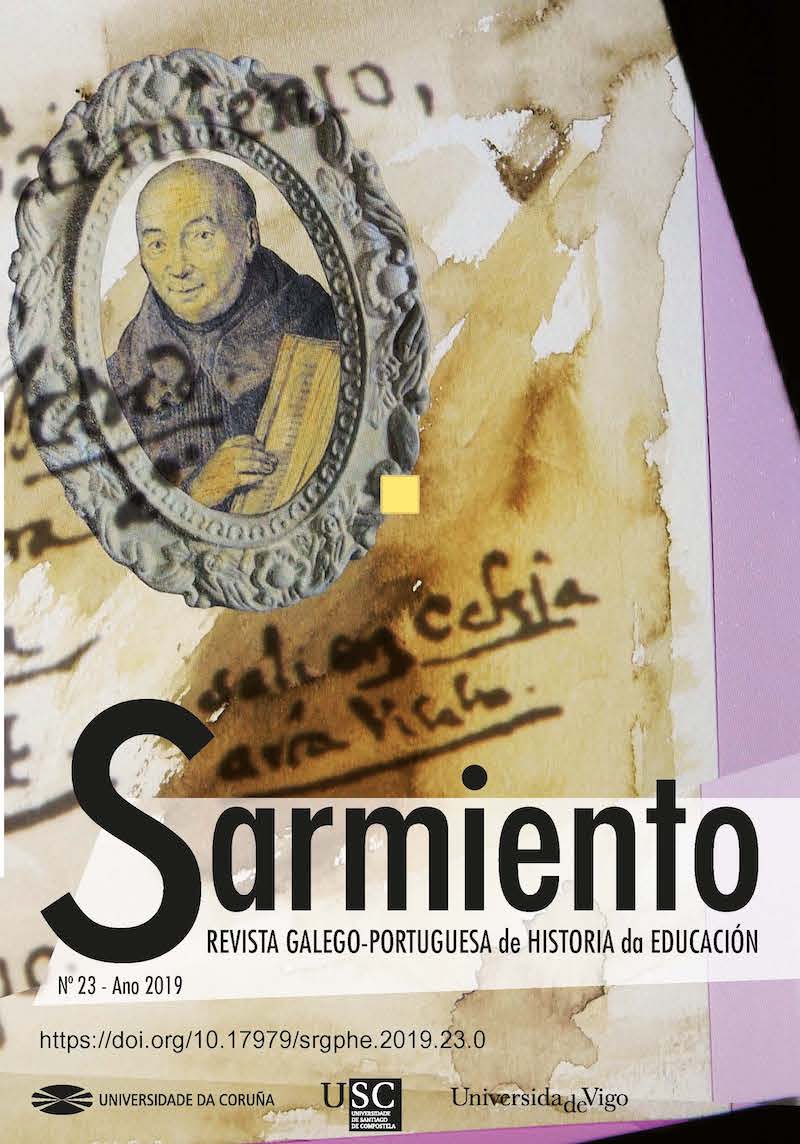Modernidade(s) educacional, cosmopolitismo e portugalidade em 105 anos da Deutsche Scule zu Porto
DOI:
https://doi.org/10.17979/srgphe.2019.23.0.5890Palavras-chave:
História da Educação, relações internacionais, ensino luso-alemão, educação integral, inovação pedagógicaResumo
A Deutsche Schule zu Porto, fundada em 1901, destaca-se no panorama educativo português como uma das escolas estrangeiras mais antigas em funcionamento, apesar das muitas vicissitudes sofridas ao longo do século XX, intimamente articuladas com a evolução política e educativa entre o país de origem e o de acolhimento. Este estudo apresenta uma breve história institucional deste estabelecimento de ensino particular em diferentes momentos, incluindo uma breve passagem pela Galiza, sublinhando a modernidade e inovação dos seus modelos pedagógicos e finalidades educativas. Assim como o cosmopolitismo de um paradigma baseado num sistema educativo alemão em constante transfiguração, sem com isso jamais prescindir de uma aculturação à realidade portuguesa ainda hoje cultivada.
Downloads
Referências
Almeida e Sousa, Francisco de. «Os 100 anos do Colégio Alemão do Porto», O Tripeiro, 7.ª série, XX-11 (2001): 343-344.
Araújo, Francisco Miguel. «Aliados versus Inimigos da Nação: sociabilidades no Porto da Grande Guerra», CEM - CEM Cultura, Espaço & Memória, 6 (2015): 145-159.
Araújo, Francisco Miguel. «O Colégio Alemão do Porto (1901-2001): um processo de inovação pedagógica a três tempos», en Roteiros da Inovação Pedagógica: Escolas e experiências de referência em Portugal no século XX / Itineraries of pedagogical innovation: reference schools and experiences in Portugal in the twentieth century, coord. Joaquim Pintassilgo & Luís Alberto Marques Alves (Lisboa: Instituto de Educação da Universidade de Lisboa, 2019), 103-136.
Araújo, Francisco Miguel. «The University of Porto in the path of European Science: innovations, exchanges and resistances during World War II», Debater a Europa, 13 (2015): 119-141.
Barros, Amândio. «Nas origens de uma respublica marítima e mercantil: o acolhimento ao estrangeiro nos portos medievais e modernos», CEM - CEM Cultura, Espaço & Memória, 6 (2015): 45.
Biedermann, Reinhard. O Colégio Alemão do Porto: 1901-1991 (Porto: Associação do Colégio Alemão do Porto, 1991).
Direcção-Geral da Estatística, Censo da População de Portugal no 1.º de Dezembro de 1911: V recenseamento geral da população (Lisboa: Imprensa Nacional, 1913).
Herzner, Dominik. Deutsche Auslandsschulen in Spanien: Auswärtige Kulturpolitik zwischen Kinflikt und Kooperation (Bielefeld: Transcript, 2019).
Heß, Joachim & Haas, Alfred. coord., Externato Deutsche Schule zu Porto: 100 Jahre/Colégio Alemão do Porto: 100 anos – 1901-2001 (Porto: Associação do Colégio Alemão do Porto, 2001).
JCornelißen, Joachim & Schwerdtfeger, René. coord., Escola Alemã de Lisboa/ Deutsche Schule Lissabon: 1848-1998 (Lisboa: Vostand des Deutschen Schulvereins. 1998).
Oliveira Ramos, Luís de. coord., História do Porto (Porto: Porto Editora, 2015).
Pintassilgo, Joaquim .coord., Laicidade, Religiões e Educação na Europa do Sul no século XX (Lisboa: Instituto de Educação da U.Lisboa, 2013).
Schwarz, Reinhard. Os Alemães em Portugal 1933-1945: a colónia alemã através das suas instituições (Porto: Antília Editora, 2006).
Fontes documentais
“Alvará n.º 1 292, de 07.05.1953”, Diário do Governo, III série, no. 127.
“Alvará n.º 1 388, de 20.10.1954”, Diário do Governo, III série, no. 262.
“Decreto n.º 2 350, de 20.04.1916”, Diário do Governo, I série, no. 77.
“Decreto n.º 2 377, de 09.05.1916”, Diário do Governo, I série, no. 89.
“Decreto-Lei n.º 35 825, de 24.08.1946”, Diário do Governo, I série, no. 191.
“Decreto-Lei n.º 46 877, de 18.02.1966”, Diário do Governo, III série, no. 41.
“Despacho n.º 6608/2000, de 09.03.2000”, Diário da República, II série, no. 72.
Licença de obra n.º 924/1931, 1931, Arquivo Histórico Municipal do Porto, D-CMP/9(606).
Processo de arrolamento dos bens do Colégio Alemão do Porto, 1916, Arquivo Nacional da Torre do Tombo, Ministério das Finanças, caixa 528, processo 144.


